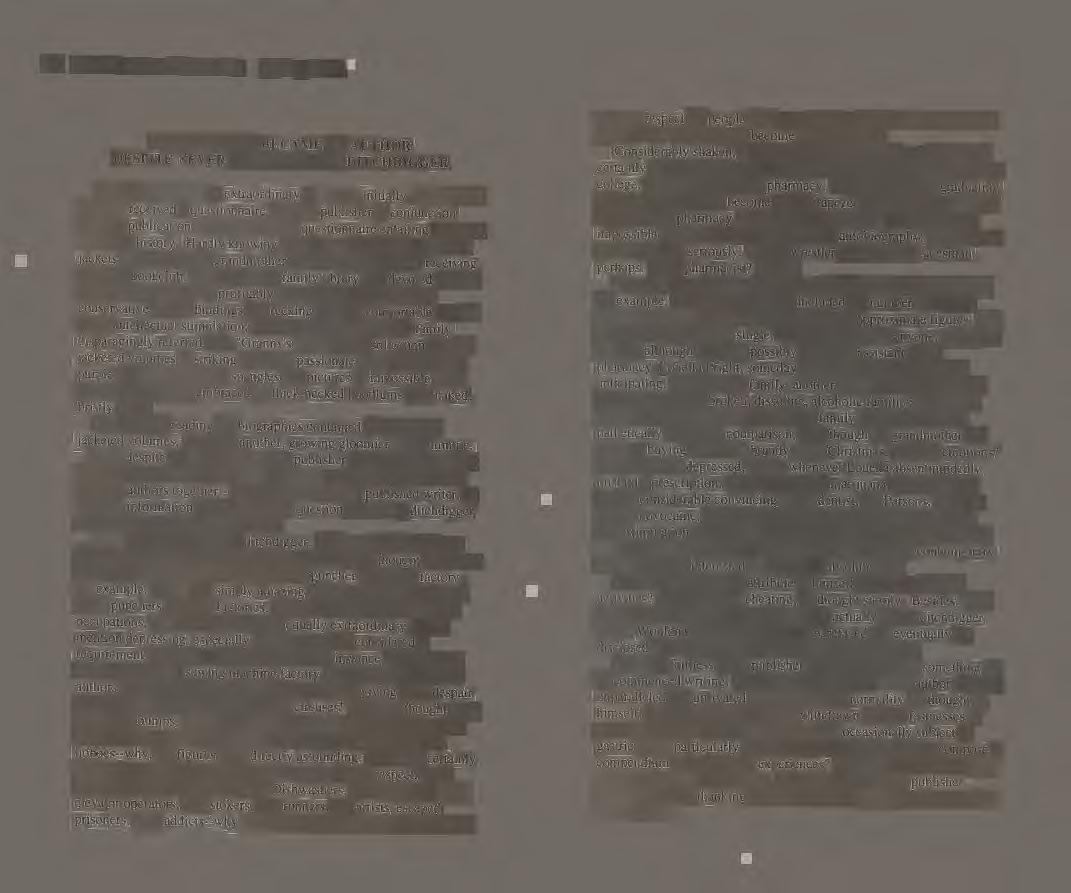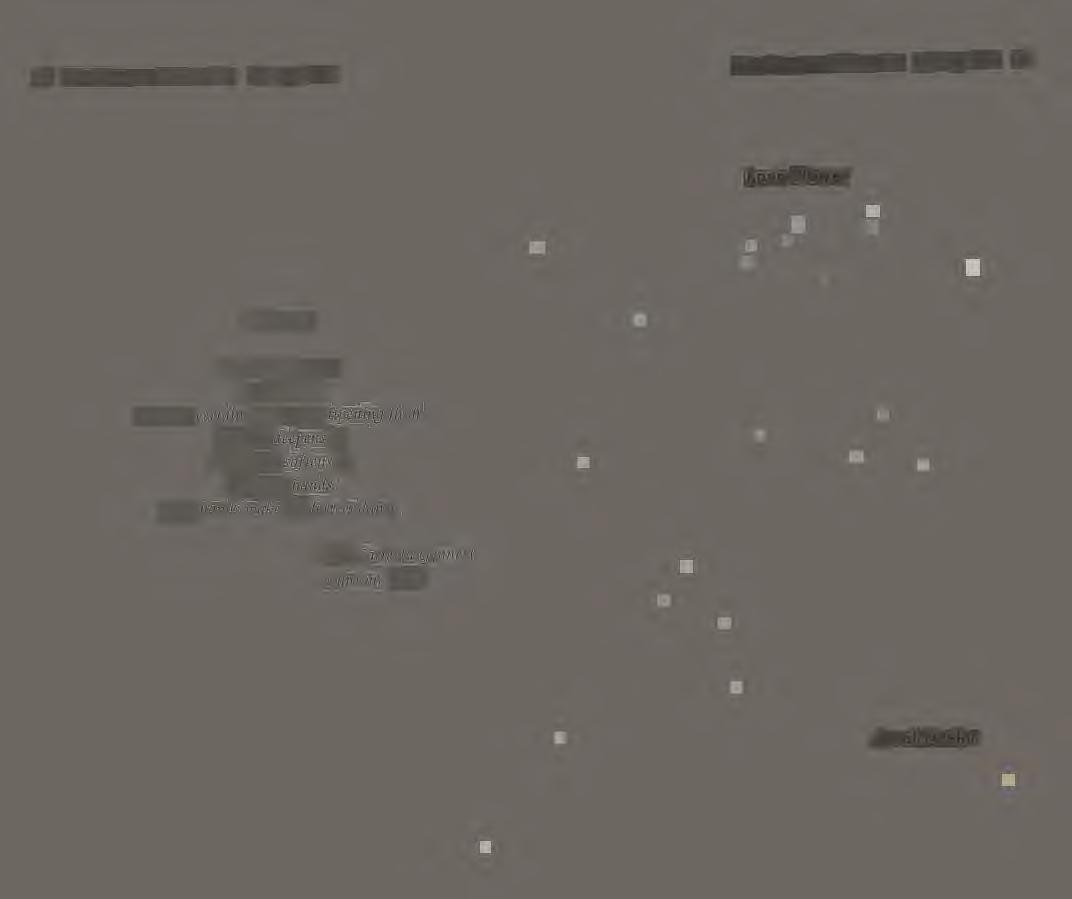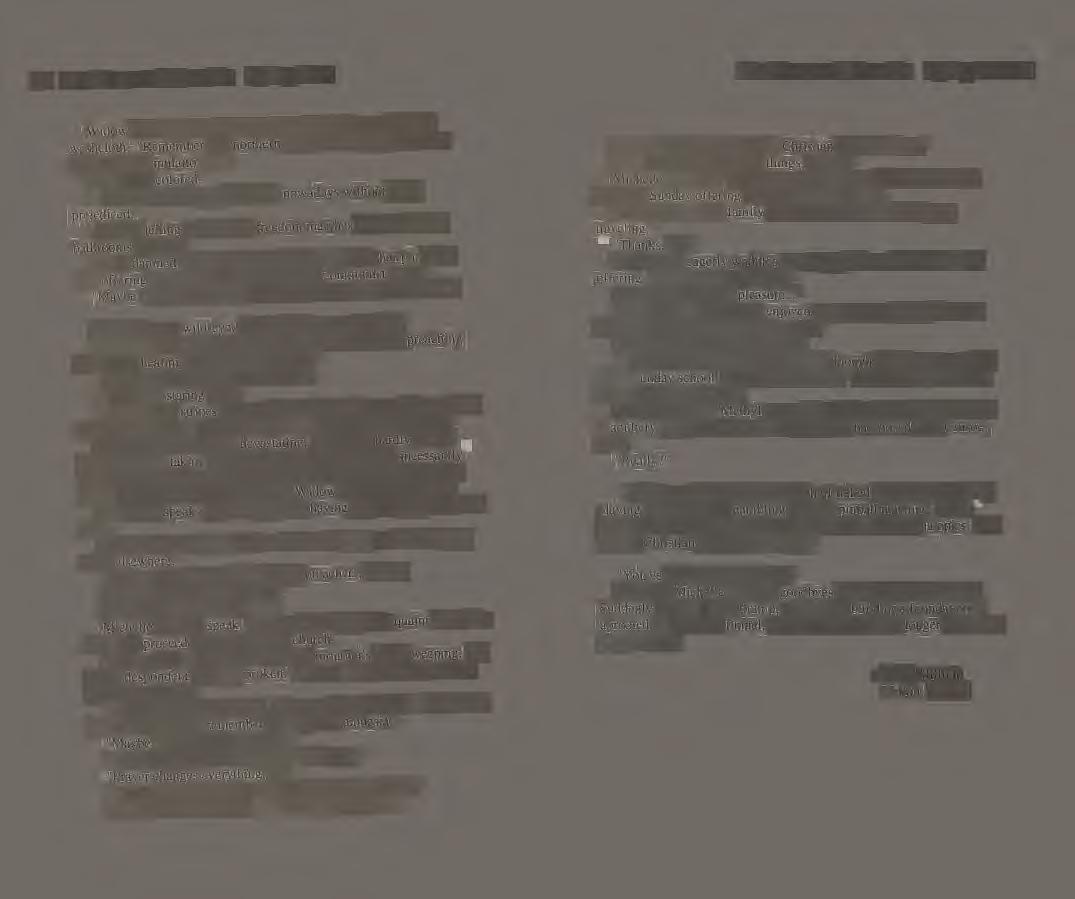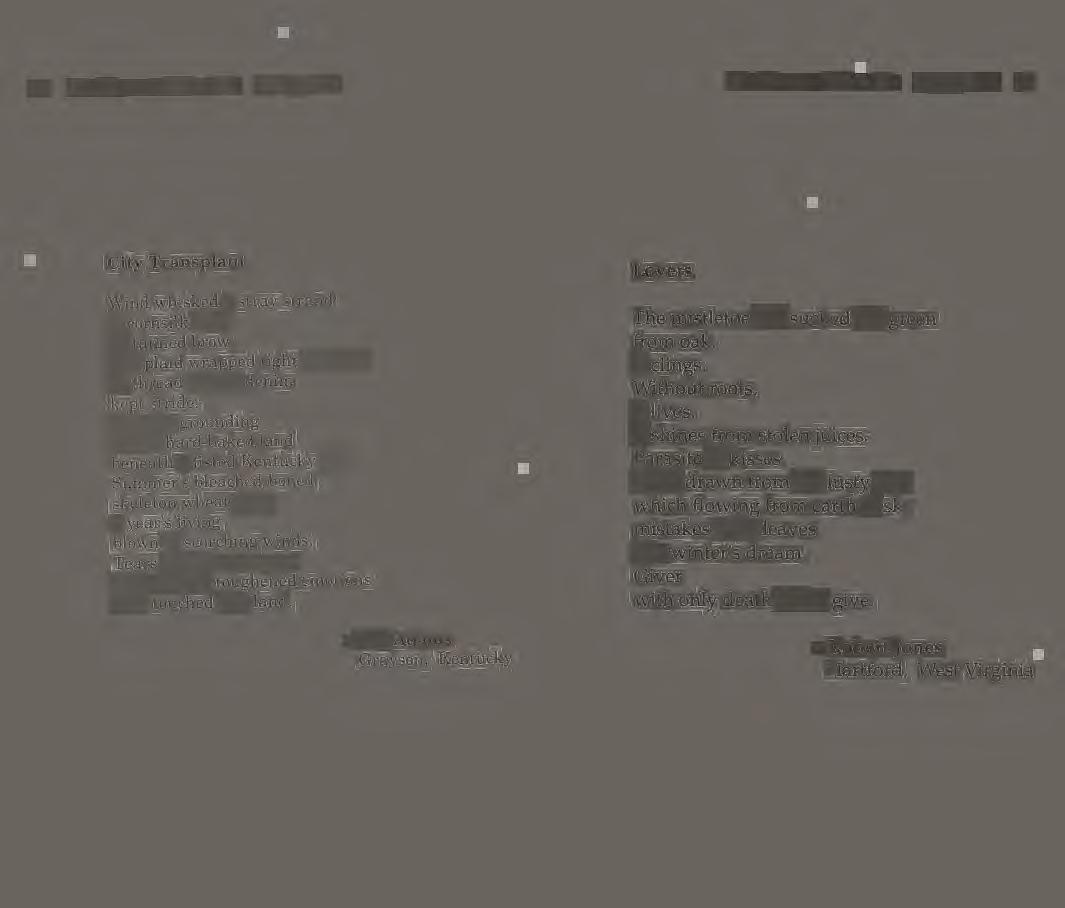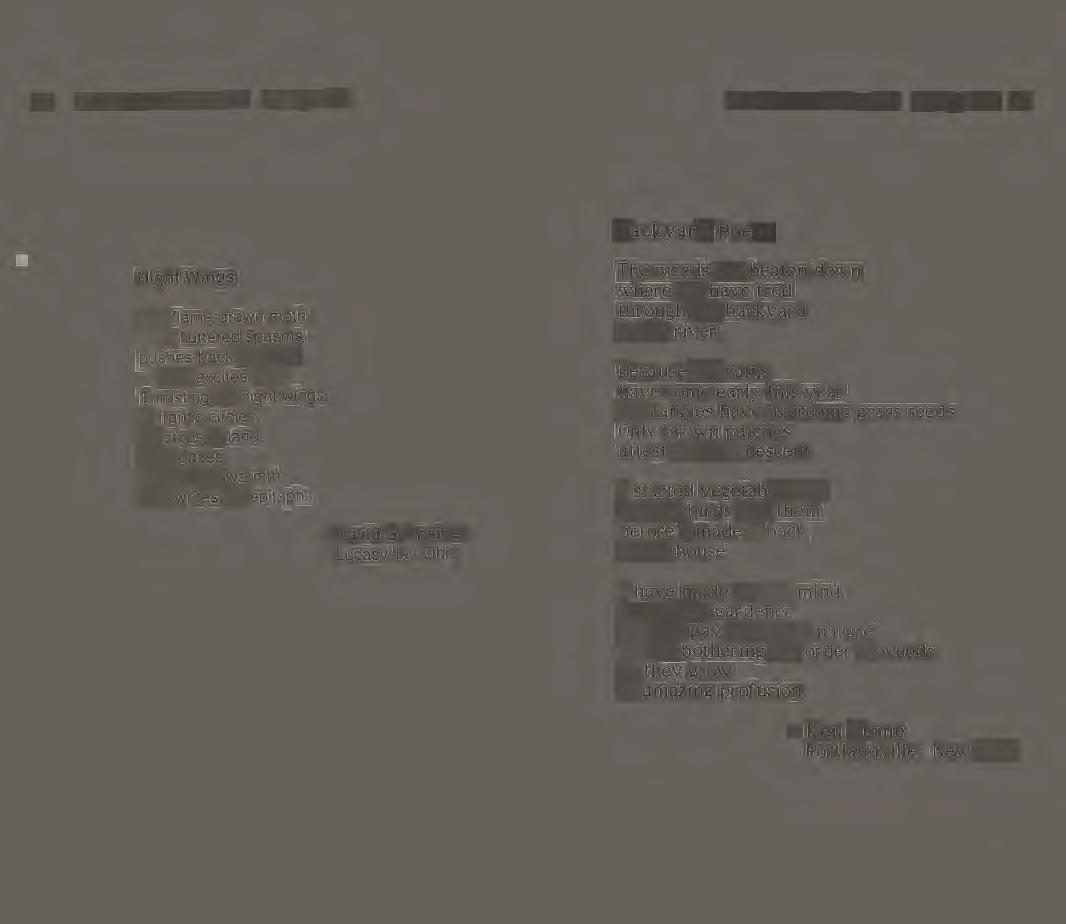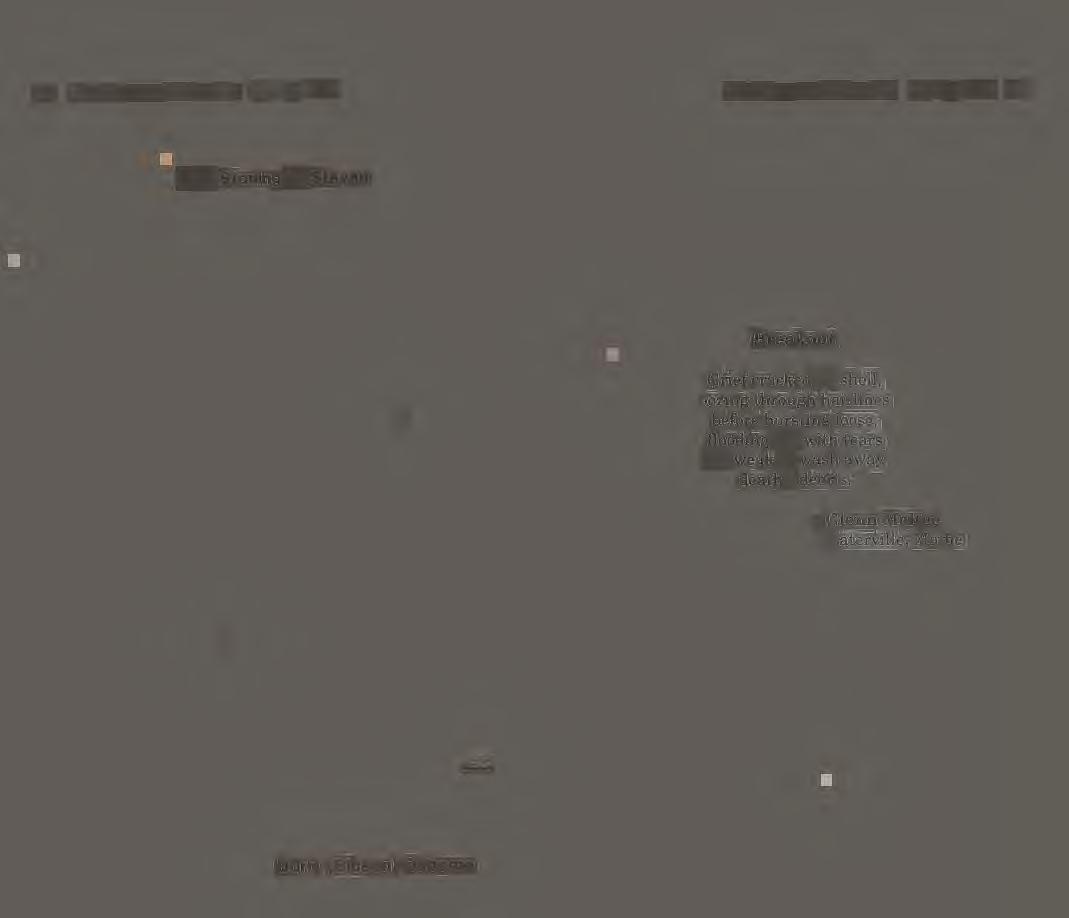'The Slia'UJnee State 'llniversity Si{fwuette
Spring, 1990
Editorial Staff
Vol. V, No. 3
Henry C. Mason, poetry editor
Tamela Carmichael, fiction editor
Janet & Valerie Nesler, photography editors
Lou & Sandy Gillenwater, art editors
Bob Wilson, adviser
Betty Hodgden, proofreader
Cover Art, Doris (Gibson) Osborne
The Shawnee Silhouette is a quarterly publication committed to perpetuating and celebrating forms of artistic expression. The basic purpose of this journal is to publish original work and to provide an outlet for practicing artisans, with and without name recognition. The publication is intended to encourage beginners and to celebrate The Arts in Appalachia and beyond. The editorial staff is committed to working with contributors, to improve the quality of their work.
Direct all correspondence to:
The Shawnee Silhouette
Shawnee State University 940 Second Street 1004 House--Room #5
Portsmouth, OH 45662
Phone (614) 354-243
Table of Contents
4-Guest Editorial
6-The Bums Who Attend Poetry Meetings
7 -Headstone
8-And the Word Shall Be Carried
10-Saint Christoper's Excommunication
11-Judevine Cemetery
12-M Church
16-the tattoo
18-Undercurrents
20-Where Master Becomes the Mastered
22-Sweet Innocence
23-The Man Who Became an Author
26-Logic Ain't the Answer
28-Fun
30-City Transplant
31-Lovers
33-Crucifix
34-Night Wings
35-Backyard Poem
37-Breakout
39-Darby
What's in a Name?
Some of my best boyhood camping memories were filed for many years under "Roosevelt Game Preserve." Those memories included a big-eyed "Bambi" staring at me from a stand of hardwood shoots busy regreening acres ravaged by forest fire. And a whippoorwill lashing the twilight closing in around the family's 1937 Chevrolet Dad drove to the lakeside campground.
After moving to Maine from Ohio many years ago, I would try to fix those memories on a map of the Buckeye State. Without success, I scanned the unfolded topography of rivers and hills in southern Ohio for the place that had made such a lasting impression. But according to my reading of Ohio's mapmakers, the Roosevelt Game Preserve had been erased from the face of Ohio. Not even my oldest sister Ruth , who left Ohio for good upon joining the Women's Army Corps during World War II, could help me sight my memories. Although she did confirm my suspicion that the Game Preserve was in southernmost Ohio, "somewhere near Portsmouth."
In August 1987, I spent a night on Campground Site #40 of Shawnee State Park. Not in a primitive canvas tent beside a '37 Chevy but in the comfort of a Volkswagen Vanagon camper. Not in the company of parents and sisters but surrounded by memories. Not in Roosevelt Game Preserve but in Shawnee State Park, bureaucratic successor to the Roosevelt Game Preserve.
Without my knowledge, Ohio had changed the Theodore Rooseveltrelated name given the area in 1922 to its present name, honoring the Indian tribe whose hunting grounds included the 60,000-acre stateowned forest and park west of Portsmouth. And I give my retroactive and enthusiastic assent to the name change, asking with Shakespeare, "What's in a name? That which we call a rose by any other name would smell as sweet."
Writing poetry is much like returning to our memories and giving them a new name. And a new name is not the only thing our memories will get as they flow from the mind onto paper or onto the screen of a word processor. They will get new faces, new hairdos, 'new clothes, new vitality. They will even get new and magic shoes with which to visit other minds if the resulting poem gets published.
The new names our memories receive as we convert them to poetry are the only names the hearers or the readers of our poeticized memories will ever know. That's why we exercise poetic license with what is stored in our minds. That's why, when the christening ceremony calls for it, we change the dandelions of memory into the roses of poetry. That's why we search for precise words and active verbs to inject the emotions of our memory into the heart of a hearer.
But what good is a name without an address? Remember to give your renamed memories current locations. Otherwise, how will your audience find the memories on the vast map of daily life? Relate these newly-named memories to familiar landmarks, to common experiences, to values held by those living on streets as well as avenues. Give your reader-friends directions to your heart and mind. They'll appreciate you all the more for this thoughtfulness.
Poetry is a way of converting private experience into public domain. But such conversions won't take place until poets are as concerned about the names they use as are proud parents of the newest child. Pick names that sing of eternity rather than this season's fad. Pick names that break into small pieces, that contain those diminutives called quotes. Pick names that fit your family tree.
The names you give your memories will be nothing more than names on paper monuments to the stillborn unless you endow them with the unique and living energy coursing through your veins. And this newly-named experience we offer the world in the guise of a poem can only have one type of blood in its veins. The blood that is ours, drawn from our family tree, that we spill in life and still in death.
Blood to keep the name alive.
--Glenn McKee Waterville, Maine
The Bums Who Attend Poetry Meetings at Cooper Union, Near the Bowery : In Memory of John Burnett Payne
More our twf than these guys', wearing coats patched in tweed. We've lifted a few, more in need than out-of-town poets with motel rooms and dames nutty about rhymes to keep them warm-while we dive for butts like pearls and try to find a Sunday Times to keep from freezing in alleys rats would cough to death in.
In winter we gather at the hall combing icicles from our beards. At least there's no talk of abstaining from "Demon drink" like at the "Army" posts. Better grub here too; little sandwiches we stuff into pockets on our way out, fresh fruit, wine they don't miss instead of the poison we pass around wondering when we'll go blind.
So, can you blame us, when the thermometer slides to twenty below outside-and New York not the friendliest town-if we keep asking these guys to read poems they've read before? It sounds nice; their voices almost like songs the Iroquois who work the Brooklyn Bridge might sing.
Besides, these guys like it; where else can they get an audience that listens so hard, afraid the end will come too soon? Everyone else can't wait for them to shut up so they can waltz back to their warm apartments. We listen as if each word was warming our hands and feet almost as well as their books would, fueling a cozy little fire with the pages.
- Robert Cooperman Pikesville, Maryland
Headstone
it has been scraped by an ancient axe, rough-hewn and pounded into a three- layered heart, shape and chisel design smoothed by four hundred years of touching. the name engraved in granite as distinguishable as the passage of time. the soul of the grave, an abandoned swallow's nest two tiers down.
- William James Kovanda Mendocino, California
.A.nc:£ the Wore:£ 8hc;a.tt Be Cc;a.rri.ec:£ 1.n Ec;a.rthen Vessets
HLs wor-c:ts an~ etchec:£ i,n bur-nt si,enna on tt,chen cover-eel stone mar-~Ln9 paths wat~ec:£ i,n ear-nest. TastLn9 the r-Lchness of mapte sap anc:£ rLver 's muc:£.
Such men season the wor-tc:£. Car-r-y wor-c:£s to ear-then vessets.
Smo~e the tt,vi,n9 bacon, mastLcate the unpatatabte, the beauty anc:£ besti,aUty, the sweetness anc:£ tfl:e r-ot.
Pr-epare a poL9nant feast for schotar-s anc:£ those too wea~ to fathom the Lnsatwbte.
- K. C. M.c:a.son Por-tsmouth, Ohi,o
Olden Days
Lou Gillenwater
Saint Christopher's Excommunication
We shared our picnic on hills scarred charcoal black, a napalm rain, under burnt husk of an old oak tree, like the towering, oxidized bronze of Lincoln in front of our old elementary school where seven valleys faraway a church bell tolled as if in celebration.
Three masts gleaming on the blue horizon, from faraway lands, Jesuit black souls that melt the gold, and at the stake render the pureness of a rose without thorns where seven seas away burns the flame of dark days, as if in celebration.
The hinge on the death house door needs oil, such an ominous sound, in contrast to the cricket chirp or the waiting downcast eyes of those waiting in quiet anticipation while seven thousand volts put to rest my anger and light the celebration.
James C. Huff Lucasville, Ohio
Judevine Cemetery ( abandoned, 1904 )
I walk this place; I fuse with stones, with mounds, feel the low-bush blueberry sink roots in my chest, feel saplings tendrilling toward my ankles. Say us they say.
There is no silence here; stone lips proclaim litany softly, oaths to ruin and rubble. The grass lends memory the slenderest of sound, and at each comer the dunce oaks rustle still durable limbs; moles burrow and the dark bird sqawks on the fence to the cloudless sky.
The heart succumbs here; but only, I say, only the heart dies.
- D. K. Singer East Burke, Vermont
THE MAN WHO BECAME AN AUTHOR DESPITE NEVER HAVING BEEN A DITCHDIGGER
The title really isn't as extraordinary as is may, initially, sound, since he'd just received a questionnaire from his publisher in conjunction with the publication of his first book, a questionnaire entailing a resume of his life history. Hardly knowing what to say, he looked at the dust jackets of the books his grandmother over the years had been receiving from her bookclub. One part of the family library was devoted to what any decent person could profitably read: books bound in solid, conservative leather bindings and reeking with the comfortable aura of sound intellectual stimulation; and the other part, which his family disparagingly referred to as "Granny's trash," was a collection of dustjacketed volumes in striking shades of passionate pink, orange, royal purple and such, with gold spangles and pictures of impossible busty young women being embraced by thick-necked hoodlums with naked, bristly arms.
So he started reading the biographies contained in these dustjacketed volumes, one after another, growing gloomier by the minute. Why, despite all the kind words his publisher had seen fit to write to him, he was no author at all! To start with, one thing seemed to bind all these authors together-- the sure sign of being a published writer, as it were: information that the author in question had been a ditchdigger at one point or another in his career.
Now, he had never been a ditchdigger. The very desire to be one had never so much as entered his mind. But then the thought had never entered his mind, either, of being a ticket puncher in a boiler factory, for example. Yet it was simply amazing how many authors had been ticket punchers in boiler factories. There were any number of other occupations, too, that to him seemed equally extraordinary, not to mention depressing, especially if they were to be considered a requirement for being an author later on. For instance, he had never been a welder in a sewing machine factory, but no fewer than seven authors from the books he got his hands on before giving up in despair had been just that. And lion tamers in circuses! The very thought gave him goose bumps, yet it seems just about every writer must first be a lion tamer in a circus these days. Then there were the bums and hoboes--why, the figures were directly astounding. He would certainly have to treat the next one he saw with a great deal of respect, as he might prove to be a future author. Dishwashers, soda jerks, bell boys, elevator operators, coal stokers, rum runners, con artists, escaped prisoners, dope addicts--why, there was no end to it! It filled him with
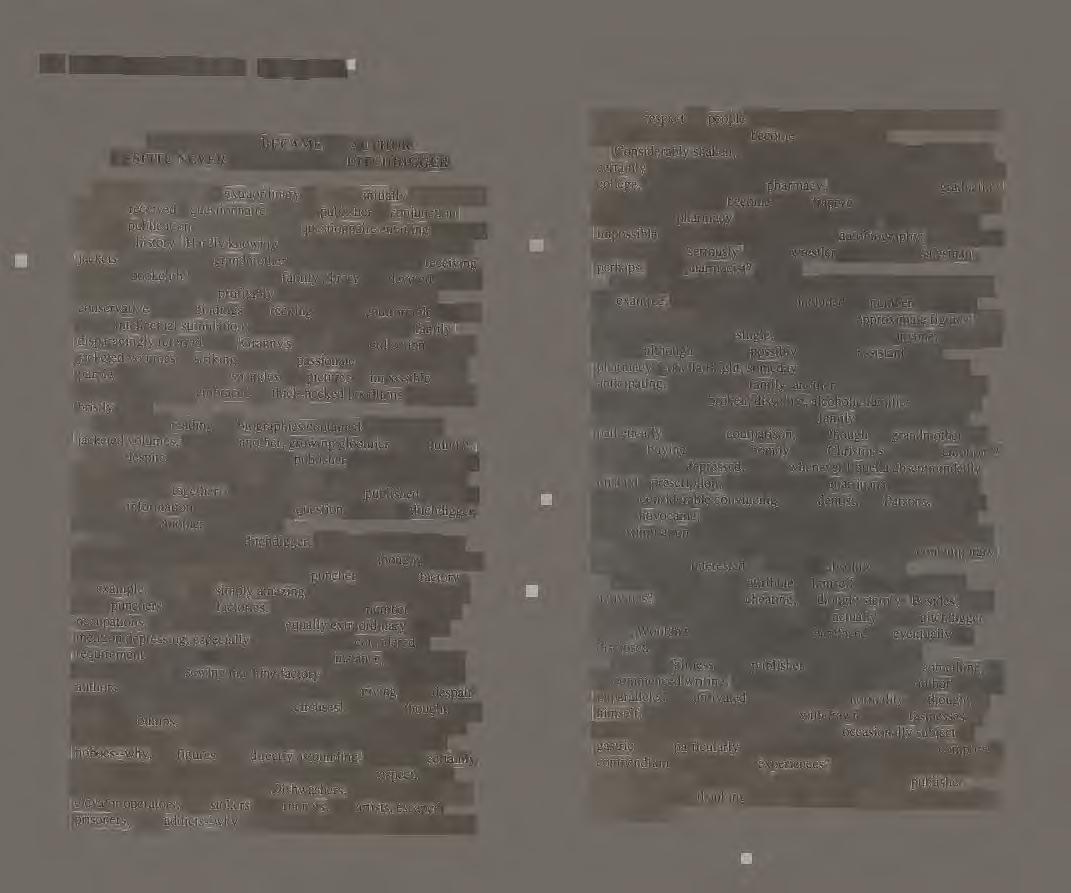
a weary respect for people who seem to get so much in in a normal life span and then have time to become writers to boot.
Considerably shaken, he settled back to review his own life. Most certainly he had missed out on a great deal. He had, to be sure, gone to college, where he had studied pharmacy. What's more, after graduating he hadn't gone out and become a high trapeze artist, either. No, sir, he had gone into pharmacy, where he was to this day. But it would be impossible to write that sort of thing in his autobiography: why, no one would take him seriously. A bear wrestler or a hair tonic salesman, perhaps. But a pharmacist? Never!
It was the same in every other aspect of his life. Take his love life, for example. Most of these writers included the number of women they'd slept with, while those who didn't gave approximate figures. He, on the other hand, being single, had never slept with anyone, except his cat; and although he might possibly marry his assistant at the pharmacy, Louella Prig ht, someday, he wasn't going to go around anticipating. And then his family, another point: all modern authors seem to come from broken, dissolute, alcoholic families and, what's more, are proud of it. To him his own family life seemed almost pathetically normal by comparison, even though his grandmother did insist on buying a bottle of brandy every Christmas. And his emotions? He was seldom depressed, except whenever Louella absentmindedly mislaid a prescription; he had never used marijuana and indeed had needed considerable convincing by his dentist, Dr. Parsons, to take a shot of novocaine; he didn't smoke or drink; and when he needed a little stimulation he took long walks in the woods at the edge of town. No, as a writer, it seems, as a serious writer of books the contemporary reader would be interested in, he was an absolute flop.
Should he tell a lie and attribute to himself all manner of lurid activities? That would be cheating, he thought sternly. Besides, what if he should ever meet an author who had actually been a ditchdigger once? Wouldn't the fact that he was a barefaced liar eventually be disclosed to all the world? And then where would he be?
Yet in all fairness to his publisher, he felt he must say something, so he commenced writing. And this is what he said: "This author, after an unparalleled and unrivaled career" (of sheer normality, he thought to himself, but that he didn't add) "has withdrawn into the fastnesses to nurse his tired and wasted body" (he being occasionally subject to gastric pains, particularly after he'd eaten too much) "and to compose a compendium about his life's experiences" his book, as a matter of fact, being about a boy and his dog, which he sent on to his publisher, along with a note thanking him for all the kind things he had seen fit to write to him. )
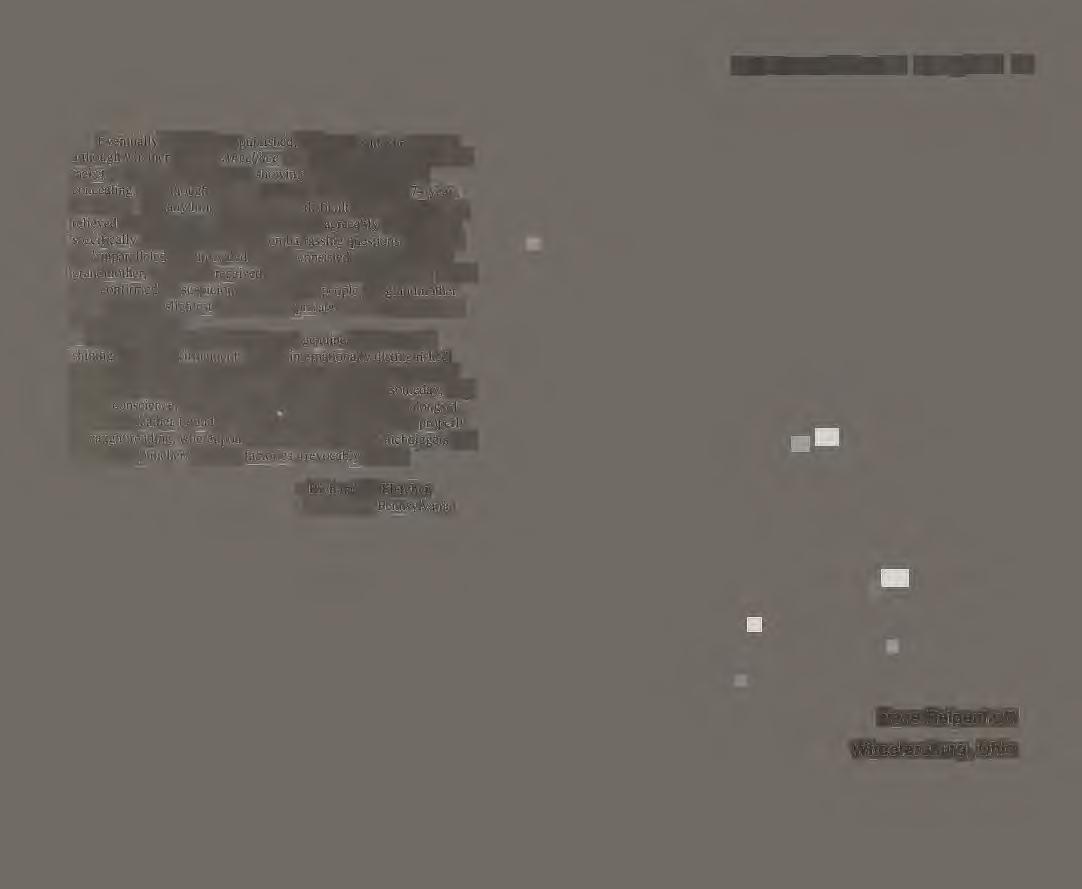
Eventually his book was published, and was a fantastic success, although whether the title Ange/face (the name of the god) or the dust jacket (of a busty young woman showing far more that she was concealing, even though the only woman in the wook was a 74-yearold widow ) had anything to do with it is difficult to say. He was very relieved that the great day came and went as agreeably as it did and, specifically, that no one asked any embarrassing questions as to what his "unparalleled and unrivaled career" consisted of. Not even his grandmother, after she'd received her copy from her book club, which only confirmed his suspicion that, like most people, his grandmother really hadn't the slightest interest in the private lives of the authors of the books she read.
It was good, too, to feel that he was a genuine author now, "a shining star in the firmament," as one internationally distinguished critic wrote about him, and that from now on his lack of a past could never again rise up to haunt him. To the point even that someday, with a clear conscience, he might be able to place his own books alongside those solid leather-bound works that any decent person could properly be caught reading, whereupon he could leave all those ditchdiggers and time- clock punchers in boiler factories irrevocably behind.
- Richard M. Fletcher North Hills, Pennsylvania
Dave Relpenhoff
Wheelersburg, Ohio
tfie. tattoo
i wear your name jamsfiia
across a certain spot on my ripening ffesfi tfie. sun aeepens it tfie. water softens it
6ut your fiancfs your fiancfs makg. tfie fetters dance
Len Carretta (jennett Canton, Ofiio
Love Flower
Janet Nesler
Undercurrents
In the darkest time of the year after the dogwood blossoms floated away and the moon was a shallow crescent drifting in the cloudy stream, father would get his carbide lamp and gig down from the smokehouse wall. After the five tines were honed to needles, he'd slip on his felt hat and I'd file after him through the dark pasture to the creek. Following the wet-weather branch, we 'd wade through sawgrass and into the water below the riffles. There, we'd pause on a sandy rise, listening to the gurgling mystery . He'd fill the lamp with carbide, and, for water, he'd dip its canister into the stream, then flame the acrid jet with his Zippo. Silver shadows beneath the surface might be leaf or mussel shell, or the long fish we sought, finning upstream in the current. My job was to stand and wait with burlap bag. I'd watch his light floating on the misty surface and see his giant hunchback shadow in the foliage of the riverbank.
As the moon washed endlessly through the fingers of the sycamores, I'd become weary of waiting alone.
So, I'd follow his light into the blackness swirling at my knees.
Water snakes were attracted to the light. They'd follow the beam to its source, periscope head slicing through the rippling surface. He'd just fling them aside with his gig.
I had neither light to attract them nor gig for protection. I'd wade the rocky bottom, alert for every prick of overhanging limb, every scrape of ankle or slither of saw-toothed blade against bare leg, never knowing what we might strike or what might strike me.
• C. G. Hughes Nicholasville, Kentucky
Where Master Becomes the Mastered
It carves a chain trail linking concrete to corner lot where knee-high weeds swallow the lady's master. Tugs her through ripe brambles into invisible.
Stumbling replaces strolling in moments of surrender.
Her commands ignored, she breaks stride. Dog usurps the rhythm, charts for her a torture course, strips her breath of voice.
I stand silenced by the drama of that voiceless stage where characters are consumed by sunfall.
No curtain. Darkness. Only.
- Harding Stedler Wheelersburg, Ohio
Harlie Parrish
Memphis, TN
Ptcviously published in Thirtun.
Sweet Innocence
rrne village iaiot fias fiis sweet repose in tfie very fact tfiat you aon't care. It aoesn't matter wfiat you may tfiink__ of tfie vi[[age iaiot.
;l-{e unaerstanas mucfi more tfian you migfit imagine anamay fioU tfie kf,y to your unravefing. -
;I-{. C. Afason Portsmoutfi, Ofiio
M Church
Wearing a neck brace over his collar, Pastor Mike says, "Like if you got two dogs you got to feed them, your flesh and yer spirit are like that, folks. Mistake it not."
Mrs. Esther Lane is appalled and says to her neighbor Widow Polk in a modulated whisper, "Can't he at least use the King's English?"
"What about the King James Bible? If it was good for my pappy, it's good for us. He started this church from the ground up."
The Methodist church had been seeking a new pastor for years but no one could satisfy the once heaven-bound congregation.
"Remember the last one, Mrs. Lane, always insisteing that he lay hands on us. Almost lost my Easter bonnet that way."
"Never trusted him. And I don't cotton to this one either. Went up to that funny cemetery, I mean seminary, in Richmond."
"Did you see his little wife? Something tells me she was in a mental institution."
"You mean Elder Crusoe told you."
"Well, Essie, his son is a psychiatrist up in Richmond. He ought to know; he's the head of the hospital up there."
"She does look odd with that simple stare of hers. Mrs. Fox thinks she might be deaf and dumb; then Mrs. Thumb told me she was an angel, so meek and quiet and calm."
"It's those drugs they've been giving her. I heard they even pumped her stomach once."
"And that's who they've appointed over us!" Mrs. Lane takes a little cloth out of her alligator handbag. :"The elders must be desperate, with all they know about Mike and Michelle. Mike and Michelle. Sounds like one of those rock and roll groups." Mrs. Lane pats her face.
"The idea of them ministering to us!"
Elder Crusoe asks the congregation to turn to the hymn, "In the Sweet By and By" and Widow Polk opens her hymnal but doesn't sing along.
"Well, let's face it, Widow Polk, our M church couldn't find a minister for several years. We had so many interim pastors I thought we'd change the church name to Interim Methodist Church ."
"So many of 'em only stayed for one Sunday to get up the offering plate."
"Well, listen, let's at least listen to Pastor Mike for as long as he'll be here."
Pastor Mike leaves the lectern a few paces. "And I tell you that the backbiter will not enter into heaven, nor the murderer nor adulterer."
Widow Polle fixes her fan. Mrs. Lane dabs her arms with the washcloth. "Remember that northern fella, Widow Polle, that came down with his mulatto wife."
"You mean colored."
"I don't know what you call them nowadays without being prejediced." . .
"And her telling us about the freedom marches and their umsex bathrooms up north." . . .
''I'll be damned Widow Polle, if I didn't give him a hru.rpm m the love offering plate~ My Hank said he was a communist agent."
"Maybe he was, but wasn't Hank once about a time in the Klan?"
When he was a wild-eyed kid he liked crosses and fire." .
"Oh, Essie, how long do we have to listen to this Mike, preachmg about faith healing with his ugly brace on."
"I'd like to know which war he was in."
"I think he's staring at us."
" ... And by His stripes we were healed. There is a war for your,,soul; like two dogs, one is master of your spirit, the other of your flesh. The heat of the church is devastating. The organ hardly works. Elder Crusoe is taking his wife with the bad nose, which incessantly runs down the front steps as it was their custom to leave the church earl;. Pastor Milce and his wife greet Widow Polle and Mrs. ~ne. . Essie Lane speaks up: "We just love having you and your little wife h~: .
"Glad to be here today. But we have to be gain; on with the good news elsewhere."
"Are you one of those circuit riding preachers, Mike?"
"Don't know what you call me."
"How does your wife call you?"
Michelle does not speak. The two ladies give her a quru.nt uckle of a smile and proceed to the back of the church. . A young man is up at the front of the mourner's bench weeping. He seems despondent and very broken . His arm is in a cast and he has a wallcer next to him.
P Mile "I don't know
"I don't know who to blame," he says to astor e. who shot me. Can't remember a thing. Had amnesia."
"Maybe it's better that way, E.V."
"I can't do much these days, Mike, but pray."
"Prayer changes everything, E.V."
"I seen so much here that goes on behind closed doors."
"Well, God knows about 'em, don't you think, E.V.?"
"Sure do, but I wonder who is Christian and who is not."
"Only God knows the deep things, I guess."
Michelle gives E.V. a cold glass of ice water. Elder Hood hands Mike the Sunday offering and Mike gives it to E.V.
"Don't need it. The family takes care of me. Use it for your traveling."
"Thanks, E.V."
A stout lady eagerly waddles over to put her one dollar bill in the offering. "Can't forget you today!"
"Who may I have the pleasure... "
"Mrs. Tuck is my name. I enjoyed your sermon, except it was so hot here. I often wonder where we are."
"What do you mean, Mrs. Tuck?"
"I seen the devil here. The real devil, though I only went up to 4th grade Sunday school, I seen the devil here." She takes her Bible and shows Mike it's in braille.
Elder Hood's wife Methyl comes by to talk to Pastor Mike. "There is adultery here; I can smell it. So could that bad-nosed Mrs. Crusoe, even."
"Really?"
"And I seen the high school kids half-naked by the pool and them playing strip poker and gambling with the pinball machine. And I know what some of these kids are fixin' to do in their old jalopies. But being a Christian woman, I won't say."
"You've said it all, Mrs. Hood."
Mike and Michelle say their goodbyes in the back of the church. Suddenly there is a loud thump, a cloud, the building's foundation is uprooted by the black funnel, and the M Church is no longer the hottest place in town.
· B. Z. Niditch Milton, Maine
Logic Ain't the Answer
Logic ain't the answer, no sir, no ma'am; logic won't overcome the power of him over me, the power of fear over faith, the power of tyranny over trust: ain't no logic in rape, nohow.
Sympathy ain't the answer neither, no way; sympathy ain't synonymous with empathy, the understanding of a sister, a bond between victims: sympathy don't get the emotion I need.
Doubly negative am I? So?
Logic ain't the answer; sympathy ain't the answer; they're too sterile. I need a fellow victim to share with: she will understand what you can't.
- Margeret Adams Birth Guaico Tamana, Trinidad, W. I.
Joanne Fyffe
Fun After the first had finished, the second fallowed, and the third; sated, they smashed her face with a metal pipe, and laughing, joyous as twisted angels, fled into the blood-stained night.
-Karl
Miller Coral Springs, Florida
Playful
Lori Cope
City Transplant
Wind whisked a stray strand of comsilk hair on tanned brow. Red plaid wrapped tight her bust as thread of blue denim kept stride. She was grounding to this hard-baked land beneath a fisted Kentucky sky. Summer's bleached-boned skeleton wheat crop: a year's living blown in scorching winds. Tears do not come easy. The sun had toughened emotions as it touched this land.
-Lee Adams Grayson, Kentucky
Lovers
The mistletoe has sucked the green from oak. It clings. Without roots, it lives. It shines from stolen juices. Parasite of kisses it has drawn from the lusty tree which flowing from earth to sky mistakes it for leaves of a winter's dream.
Giver with only death left to give.
- Robert Jones Hartford, West Virginia
·Harne Parrish
Memphis, TN
Cl"uclflx
Later, after introductions, things are progressing. But the chain with the crucifix keeps getting in the way. So, he asks her if she wouldn't mind please leaving it on the nightstand. She obi iges, taking it off and laying It down in one swift motion.
Coral Springs, Florida
-Kai" I MI I I el"
Night Wings
The flame-drawn moth, in fluttered spasms, pushes back the heat that excites him. Thrusting his night wings in frantic circles, he stops to land, then dozes in the near warmth that writes his epitaph.
- David Schnelder Lucasville, Ohio
Backyard Poem
The weeds are beaten down where we have trod through the backyard to the river.
Because the rains have come early this year the tangles have overcome grass seeds. Only brown patches attest to hoe's descent.
I started vegetables too but the birds had them before I made it back to the house.
I have made up my mind. I am not a gardener but can pay tribute to nature by not bothering the order of weeds as they grow in amazing profusion.
- Ken Stone Portlandville, New York














